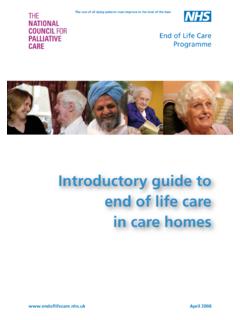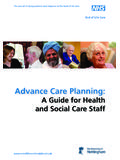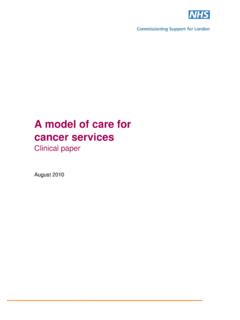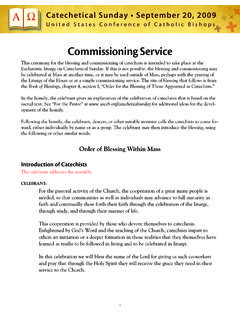Transcription of Commissioning Guidance for Specialist Palliative Care ...
1 Commissioning Guidance for Specialist Palliative care : Helping to deliver Commissioning objectives Developed in collaboration with: Association for Palliative Medicine of Great Britain and Ireland Consultant Nurse in Palliative care Reference Group Marie Curie Cancer care National Council for Palliative care Palliative care Section of the Royal Society of Medicine December 2012 2 This document should be referenced as: Commissioning Guidance for Specialist Palliative care : Helping to deliver Commissioning objectives, December 2012. Guidance document published collaboratively with the Association for Palliative Medicine of Great Britain and Ireland, Consultant Nurse in Palliative care Reference Group, Marie Curie Cancer care , National Council for Palliative care , and Palliative care Section of the Royal Society of Medicine, London, UK. Enquiries should be made to the Association for Palliative Medicine Secretariat at: Association for Palliative Medicine of Great Britain and Ireland 76 Botley Road Park Gate Southampton SO31 1BA Tel: 01489 565665 3 Contents Executive summary.
2 5 Introduction .. 6 What this Guidance covers .. 6 What is Specialist Palliative care ? .. 6 Variation in service provider .. 8 Orientation .. 8 What can Specialist Palliative care offer .. 10 Meeting the NHS outcomes framework .. 10 Helping to deliver QIPP indicators for End of Life care .. 11 What a good quality Specialist Palliative care service should include .. 12 The Specialist Palliative care team .. 12 Specialist Palliative care activities .. 12 Referral criteria for Specialist Palliative care .. 13 How much Specialist Palliative care is needed? .. 15 Numbers of deaths and prevalence of Palliative care needs .. 15 How much Specialist Palliative care is currently delivered? .. 16 National and international recommendations about Specialist Palliative care provision .. 19 What is currently happening in the system? .. 21 Future Developments .. 22 The potential for cost reduction and cost avoidance .. 23 Measuring value and impact .. 25 Glossary .. 27 Authorship .. 28 References.
3 29 Appendix A .. 31 Appendix B .. 36 Figure 1: Relationship between Specialist Palliative care (SPC) and end of life 7 Figure 2: Different types of care provision .. 8 4 5 Executive summary Currently, about 355,000 people across England need end of life care each year, a substantial proportion of whom will need Specialist Palliative care because of the level of complexity of their needs. The purpose of this document is to provide commissioners with key information to help them commission Specialist Palliative care , as a specific component of the whole spectrum of Palliative and end of life care service provision. Commissioning Specialist Palliative care can help commissioners achieve a number of wider Commissioning goals, especially in relation to Domains 2 and 4 of the NHS Outcomes Framework and in delivering the QIPP indicators for end of life care . Specialist Palliative care is delivered across primary and secondary care , and is provided by teams based in, and funded by, both the NHS and the voluntary sector.
4 Commissioning an integrated service for patients with progressive, advanced disease, and their families, must take into account local variations in service provision and funding streams. Currently Specialist Palliative care is provided to an estimated 160,000 - 170,000 people across England annually. Historically, the larger proportion of these people will have advanced cancer, but those with end-stage organ failure, neurodegenerative diseases and advanced dementia also need comprehensive and timely access to Specialist Palliative care . Their unmet needs will require identification and addressing. Our ageing population, with the inevitable increase in co-morbidity, and rising expectations and aspirations for high quality care towards the end of life by both public and professionals, means that the demands on both generalist and Specialist Palliative care will increase. The only certain prediction about how much Specialist Palliative care is needed in the future is that it will rise.
5 This document sets out the factors that commissioners need to consider in Commissioning Specialist Palliative care , sources of information and data that could help them (recognising the limitations in current availability of robust data), how value and impact might begin to be measured, and some early evidence of the potential for cost reduction and cost avoidance. 6 Introduction The purpose of this document is to provide commissioners with key information that may be helpful in Commissioning Specialist Palliative care as distinct from generic end of life care , for which Commissioning Guidance already exists. By Commissioning Specialist Palliative care , commissioners should also be able to achieve a number of wider Commissioning goals, such as a reduction in unnecessary hospital admissions. Specialist Palliative care is a diverse discipline that takes place across many different settings and is provided by teams based in the NHS and in the voluntary sector.
6 Variations in scope and setting result in a range of local arrangements for the delivery of Specialist Palliative care . What this Guidance covers The terminology which has grown up in this area is poorly understood and lacks clarity. Terms such as hospice care , Palliative care , supportive care , Specialist Palliative care , generic or general(ist) Palliative care , end of life care etc are not always used clearly or consistently see Glossary (page 27) for full definitions. This Guidance relates specifically to Specialist Palliative care (SPC), its role in delivering and supporting the spectrum of Palliative and end of life care and how, by Commissioning SPC, commissioners may meet a number of wider Commissioning objectives. What is Specialist Palliative care ? Specialist Palliative care is the active, total care of patients with progressive, advanced disease and their families. care is provided by a multi-professional team who have undergone recognised Specialist Palliative care training.
7 The aim of the care is to provide physical, psychological, social and spiritual support .. (Tebbit, National Council for Palliative care , 1999) 7 The relationship between SPC and end of life care is illustrated in Figure 1 below: Figure 1: Relationship between Specialist Palliative care (SPC) and end of life care There are no nationally agreed criteria for accessing SPC (see Referral criteria for Specialist Palliative care : page 13), but a common theme is that of complexity. Complexity is not only about the patient s level of need. It also reflects the inter-relationship between the complexity of the patient need and the confidence and skills of the non-SPC practitioner (either in primary or secondary care ). Depending on local variations, commissioners may wish to commission SPC on its own, or to commission across the whole spectrum of Palliative and end of life care , seeking lead providers to coordinate integrated care .
8 Whatever the model used locally, SPC is a necessary component of service provision and needs to be explicitly commissioned. 8 Variation in service provider The diagram below illustrates the way services might provide different types of care , as decided by local negotiation. This is intended to be illustrative rather than comprehensive, and Specialist Palliative care providers may be involved in providing, or leading the provision of, some aspects of end of life care : Figure 2: Different types of care provision Specialist Palliative care Inpatient SPC beds Community SPC Hospital SPC advisory teams SPC outpatients & day therapy Hospice At Home services Coordination servicesEnd of life care Inpatient acute hospital wards GP provision District/community nursing Out of hours primary care care homesSpecialist Palliative careEnd of life careLocally determined (may be provided by SPC or generic provider) Orientation SPC is not only about providing care for people in their last year of life, but with approximately 1% of the UK population dying each year, it is critically relevant to the delivery of end of life care for this group of people.
9 The majority of those dying will be older people suffering multiple co-morbidities, the predominant causes of death being cardiovascular disease, chronic lung disease and cancer. The needs of such patients in the last phase of life will be for a combination of health and social care services. These will be 9 met by a diverse range of providers and informal unpaid carers (family and friends). General practitioners and district nurses provide the backbone of health care services at home. Frequently those with the most difficult and complex problems, some of whom will be younger people, will require SPC provided by multi-professional teams of individuals who have had Specialist training in this area. SPC teams also act as major sources of advice, support and education to others involved in providing this care . Historically, most patients referred to SPC services have had a diagnosis of cancer.
10 Increasingly patients with non malignant disease are being referred to SPC too. The extent to which this happens and the range of diagnoses covered, vary considerably depending on local negotiations some SPC providers will care for the elderly frail with multiple co-morbidities, but many are not commissioned or resourced to do so. Patients in the last phase of life (whatever their diagnosis) have a common set of needs across physical, psychological, social and spiritual domains which the model of holistic, multidisciplinary care that SPC represents can meet. Because of the difficulty of prognostication and reticence on the part of healthcare professionals and/or patients to discuss the possibility of death and dying, the last phase of life is frequently identified or accepted late in the illness trajectory or indeed only after marked deterioration or even death. Often, the problems patients and their families experience in the dying phase have been longstanding and/or predictable, and the more complex of these could have benefited from interventions from SPC experts at an earlier stage.















